- Home
- Harlan Coben
Caught (2010) Page 11
Caught (2010) Read online
Page 11
The not knowing. It weighs on you. You start to want an answer, any answer, and that just makes you feel more guilt-ridden and horrible. The guilt ate him up, kept him up every single night. Ted was not good with confrontation. It made his heart beat too fast. An argument with a neighbor last year over a property line had robbed him of weeks of sleep. He stayed up, re hashed, reargued.
It was his fault.
Man Rule Number One: Your daughter is safe in your home. You take care of your family. However you want to spin this horror, that was the plain fact: Ted hadn't done his job. Had someone broken in and snatched his Haley away? Well, that would be on him, wouldn't it? A father protects. That's job one. And if Haley had left the house on her own that night, sneaked out somehow? That was on him too. Because he hadn't been the kind of father his daughter could go to and tell what was wrong or what was going on in her life.
The rehashing never stopped. He wanted to go back, change one thing, alter the universal time structure or whatever. Haley had always been the strong child, the independent one, the competent one. He had marveled at her resourcefulness, which definitely came from her mother. Had that been part of it? Had he figured, well, Haley doesn't need as much parenting, as much supervision, as Patricia and Ryan?
Useless, constant rehashing.
He was not a depressive type, not at all, but there were days, dark, bleak days, when Ted remembered exactly where his dad kept his pistol. He pictured the whole scene now--making sure no one was home; walking into his childhood house where his parents still lived; taking the pistol from the shoebox on the top of the closet; walking down to the basement where he had first made out with Amy Stein in seventh grade; moving into the washer-dryer room because the floor there was cement, not carpet, and easier to clean. He would sit on the floor, lean against the old washer, put the pistol in his mouth--and the pain would end.
Ted would never do it. He wouldn't do that to his family, add to their suffering in any way. A father didn't do that. He took it on himself. But in his more honest, more frightening moments, he wondered what it meant that thinking about that release, that end, sounded so damn sweet.
Ryan was in the game now. Ted tried to concentrate on that, on his boy's face through the protective cage, mouth distorted by the guard, tried to find some joy in this rather pure childhood moment. He still didn't get the boys' lacrosse rules--the boys' game seemed entirely different from the girls'--but he knew that his son was playing attack. That was the position where you had the best chance of scoring a goal.
Ted cupped his hands around his mouth, forming a flesh megaphone. "Go, Ryan!"
He heard his voice echo dully. For the past hour, other parents had called out constantly, of course, but Ted's voice sounded so awkward, so out of place. It made him cringe. He tried to clap instead, but that, too, felt awkward, as if his hands were the wrong size. He turned away for just a second, and that was when he saw him.
Frank Tremont trudged toward him as though through deep snow. A big black man, definitely another cop, walked with him. For a moment, hope spread its wings and took flight. Ted felt something inside him soar. But only for a moment.
Frank's head was down. As he drew closer, Ted could see that the body language was all wrong. Ted felt the quake begin in his knees. One buckled but he held himself upright. He started crossing the sidelines to meet up with him faster.
When they were close enough, Frank said, "Where's Marcia?"
"She's visiting her mother."
"We need to find her," Frank said. "Now."
Caught
Chapter 14
A GIANT SMILE spread across Pops's face when they entered the Blend bar.
"What?" Wendy asked.
"More cougars on those bar stools than on the Discovery Channel."
The bar had low lights and smoky mirrors, and everyone was dressed in black. He was right about the clientele. In a way.
"By definition," Wendy said, "a cougar is an older woman who frequents clubs to score with younger men."
Pops frowned. "Some of them still gotta have Daddy issues, right?"
"At your age, you should hope for a Daddy complex. Check that--Grandpa complex."
Pops looked at her, disappointed, as though the line was super lame. She nodded an apology because, yeah, it was.
"Mind if I mingle?" Pops asked.
"I cramp your style?"
"You're the hottest cougar here. So, yes. Though some chicks dig that. Like they're stealing me away."
"Just don't bring any of them home. I have an impressionable teenage son at home."
"I always go to her place," Pops said. "I don't like her knowing how to find me. Plus I save her the morning walk of shame."
"Thoughtful."
Blend had a bar up front, restaurant in the middle, club in the back. The club was holding the open-mike night. Wendy paid the cover charge--five bucks including a drink for men, one buck including a drink for the ladies--and ducked inside. She could hear Norm, aka Ten-A-Fly, rapping: Hotties, listen up,
You may not be in Tenafly
But Ten-A-Fly gonna be deep in you. . . .
Oy, she thought. There were forty, fifty people gathered around the stage, cheering. TenA-Fly wore enough gold bling to make Mr. T envious and a trucker hat with a flat brim and forty-five-degree tilt. He held up his droopy trousers with one hand--might have been because they were too big, might have been because the guy had absolutely no ass--while the other gripped the microphone.
When Norm finished that particularly romantic ditty with the closer that Ten-A-Fly be so deep in you, you be begging for no Engle-Wood, the crowd--median age: early forties--gave him a huge ovation. A red-clad maybe-groupie in the front threw something onstage, and with something approaching horror, Wendy realized that they were panties.
Ten-A-Fly picked them up and took a deep sniff. "Yo, yo, love to the ladies out there, the burning shawties, Ten-A-Fly and the FC in da house!"
The maybe-groupie put her hands in the air. She wore, God help her, a T-shirt that read, "Ten-A-Fly's Main Ho!"
Pops came up behind her. He looked pained. "For the love of all that is merciful . . ."
Wendy scanned the room. She spotted the rest of the Fathers Club--FC?--near the front, including Phil. They cheered wildly for their man. Wendy's gaze traveled back and settled on a petite blonde sitting alone near the back. Her eyes were down and on her drink.
Sherry Turnball, Phil's wife.
Wendy swam through the crowd, making her way toward her. "Mrs. Turnball?"
Sherry Turnball turned from her drink slowly.
"I'm Wendy Tynes. We talked on the phone."
"The reporter."
"Yes."
"I didn't realize that you were the one who did the story on Dan Mercer."
"Did you know him?"
"I met him once."
"How?"
"He and Phil lived in the same suite at Princeton. I met him at the political fund-raiser we held for Farley last year."
"Farley?"
"Another classmate." She took a sip of her drink. On the stage, Ten-A-Fly asked for quiet. "Let me tell you about this next number." A hush fell over the room. Ten-A-Fly took off his sunglasses as if they'd angered him. His scowl aimed for intimidation but seemed more in the neighborhood of constipation.
"So one day I'm sitting at Starbucks with my homies in the FC," he began.
The Fathers Club hooted at the shout-out.
"I'm sitting there, enjoying my latte or whatnot, and this dial-nine-one-one-kickin' shawty walks by, and man-o-man she's working it up top, if you know what I'm saying."
The cheers said, We know what you're saying.
"And I'm looking for inspiration, for a new tune and whatnot, and I'm checking out this fivealarm shawty in a halter top . . . and this phrase just comes to me: 'Swing dem puppies.' Just like that. She saunters by, head up, working it up top, and I think to myself, 'Yeah, baby, swing dem puppies.' "
Ten-A-Fly paused to
let that sink in. Silence. Then someone yelled: "Genius!"
"Thanks, brother, I mean that." He pointed at the "fan" in some complicated way, like his fingers were a gun turned on its side. "Anyway, my homies in the FC helped me take this rap and bring it up to the next level. So this is for you guys. And of course, all you top-heavy shawties out there. You be Ten-A-Fly's inspiration."
Applause.
Sherry Turnball said, "You think this is all pretty pathetic, don't you?"
"Not my place to judge."
Ten-A-Fly began to perform what some might consider a "dance," though medical experts would probably classify it as a "seizure" or "devastating stroke."
Yo, girl, swing dem puppies,
Swing em like you're my favorite ho,
Swing dem puppies,
Swing dem like you're Best in Show,
Swing dem puppies,
Yo, got here a bone to feed ya,
Swing dem puppies,
Take it, girl, be no protest from PETA . . .
Wendy rubbed her eyes, blinked, opened them again.
By now, the other members of the Fathers Club were standing and joining in for the "Swing Dem Puppies" chorus, letting Ten-A-Fly solo on the lines between:
Swing dem puppies,
Ten-A-Fly: "No need to scream and holler."
Swing dem puppies.
Ten-A-Fly: "Swing dem right, I gives you a pearl doggie collar. . . ."
Wendy made a face. The men were up now. The guy who'd been wearing the tennis whites was all prepped out in a bright green polo. Phil had khakis and a blue button-down. He was standing and clapping and seemingly lost in the rap. Sherry Turnball stared off.
"You okay?" Wendy asked.
"It's nice to see Phil smile."
The rap went on for a few more verses. Wendy spotted Pops talking up two ladies in the corner. The biker look was rare in suburbia--and some tony club hopper always wanted to take home the bad boy.
Sherry said, "See the woman sitting up front?"
"The one who threw her panties onstage?"
She nodded. "That's Norm's--uh, Ten-A-Fly's--wife. They've got three kids, and they're going to have to sell their house and move in with her parents. But she's supportive."
"Nice," Wendy said, but looking again, the cheering looked a little too forced, closer perhaps to classic overcompensation than true enthusiasm.
"Why are you here?" Sherry Turnball asked.
"I'm trying to find out the truth about Dan Mercer."
"A little late, don't you think?"
"Probably. Phil said something strange to me today. He said he understood what it was like to be wrongly accused."
Sherry Turnball played with her drink.
"Sherry?"
Her eyes rose and met Wendy's. "I don't want him hurt anymore."
"That's not my intent here."
"Phil wakes up every morning at six and puts on a suit and tie. Like he's going to work. Then he buys the local papers and drives down to the Suburban Diner on Route Seventeen. He sits there alone with his coffee and goes through the classifieds. By himself, wearing a suit and tie. Every morning, alone. The exact same thing."
Wendy flashed again on her father sitting at the table stuffing resumes into envelopes.
"I try to tell him it's okay," Sherry said. "But if I suggest moving down to a smaller house, Phil takes it as a personal failure. Men, right?"
"What happened to him, Sherry?"
"Phil loved his job. He was a financial adviser. A money manager. Nowadays those are negative terms. But Phil used to say, 'People trust me with their life savings.' Think about that. He cares for people's money. They entrust him with their toil, their kids' college education, their retirement. He used to say, 'Imagine the responsibility of that--and the honor.' It was all about trust with him. About honesty and honor."
She stopped. Wendy waited for her to continue. When she didn't, Wendy said, "I did some research."
"I'm going back to work. Phil doesn't want that. But I'm going back."
"Sherry, listen to me. I know about the embezzlement charge."
She stopped as though she'd been slapped. "How?"
"That's not important. Is that what Phil meant by wrongly accused?"
"The allegations are trumped-up nonsense. An excuse to fire one of their most highly paid. If he was guilty, why hasn't he been charged?"
"I'd like to talk to Phil about it."
"Why?"
Wendy opened her mouth, stopped, closed it again.
Sherry said, "It doesn't have anything to do with Dan."
"Maybe it does."
"How?"
Good question.
"Will you talk to him for me?" Wendy asked.
"And say what?"
"That I want to help him."
But a thought hit Wendy, something Jenna had said, something Phil and Sherry had said too, stuff about the past, about Princeton, the name Farley. She needed to get home, get to a computer, do some research. "Just talk to him, okay?"
Ten-A-Fly started up another song, an ode to some MILF named Charisma, plagiarizing himself with some joke about having no charisma in him but wanting to be in Charisma. Wendy rushed over to Pops.
"Come on," she said.
Pops gestured toward the tipsy woman with the beckoning smile and plunging neckline. "Working here."
"Get a phone number and tell her to swing dem puppies at you later. We've got to get out of here."
Caught
Chapter 15
GOAL ONE FOR INVESTIGATOR Frank Tremont and Sheriff Mickey Walker: Find a connection between molester Dan Mercer and missing girl Haley McWaid.
Haley's phone had so far provided few clues--no new texts, e-mails, or calls--though Tom Stanton, a young Sussex County cop with some techno background, was still going through it. Still, with the help of a teary Ted and steely Marcia, it didn't take long to come up with a link between Haley and Dan Mercer. Haley McWaid had been a senior at Kasselton High School. One of her classmates was a girl named Amanda Wheeler, stepdaughter of Jenna Wheeler, Dan's ex. Dan Mercer was friendly with his ex-wife and purportedly spent a great deal of time at their house.
Connection.
Jenna and Noel Wheeler sat on a couch across from him in their classic split-level home. Jenna's eyes were puffy from recent tears. She was a small woman, tight body like she worked out, probably striking when her face wasn't bloated from crying. The husband, Noel, was, Tremont had learned, head of cardiac surgery at Valley Medical Center. His hair was dark, unruly, a little too long--almost like what you'd expect in a concert pianist.
Another plush couch, Frank thought, in another lovely suburban home. Like with the McWaids. Both couches were nice, probably pretty expensive. This one was bright yellow with blue flowers. Springlike. Frank pictured it, the two of them, Noel and Jenna Wheeler (or Ted and Marcia McWaid), going to some highway furniture store, probably on Route 4, testing out a bunch of couches, trying to figure out which one would go in their lovely suburban home, match both the decor and lifestyle, combine comfort and durability, how it would blend in with the designer wallpaper and Oriental carpet and the knickknacks from that trip to Europe. They had it delivered and moved it from spot to spot until it was just right, collapsed into it, called the kids to try it out, maybe even sneaked down late one night to break it in.
Sussex County sheriff Mickey Walker loomed behind him like a solar eclipse. Now that the two cases were overlapping, there would be full cooperation--no county jurisdiction bickering when you're trying to find a missing girl. They agreed that Frank would lead this line of questioning.
Frank Tremont coughed into his fist. "Thank you for agreeing to talk with us."
"Have you found something new about Dan?" Jenna asked.
"I wanted to ask you both about your relationship with Dan Mercer."
Jenna looked puzzled. Noel Wheeler did not move. He leaned slightly forward, his forearms rested on his thighs, his fingers laced between his knees.
/>
"What about our relationship?" Jenna asked.
"You were close?"
"Yes."
Frank looked at Noel. "All of you? I mean, he is your wife's ex."
Again it was Jenna who answered. "All of us. Dan is . . . was . . . the godfather of our daughter Kari."
"How old is Kari?"
"What does that have to do with anything?"
Frank put a little steel in his voice. "Please just answer the question, Mrs. Wheeler."
"She's six."
"Did she spend time alone with Dan Mercer?"
"If you're insinuating--"
"I'm asking a question," Frank said, cutting her off. "Did your six-year-old daughter spend time alone with Dan Mercer?"
"She did," Jenna said, head high. "And she loved him dearly. She called him Uncle Dan."
"You have another child, don't you?"
Noel took that one. "I have a daughter from a previous marriage, yes. Her name is Amanda."
"Is she home right now?"
Frank had already checked on this and knew the answer.
"Yes, she's upstairs."
Jenna looked toward the silent Walker. "I don't see what any of this has to do with Ed Grayson killing Dan."
Walker just stared back at her, arms folded.
Frank said, "How often did Dan come to this house?"
"What difference does that make?"
"Mrs. Wheeler, do you have something to hide?"
Jenna's mouth dropped open. "Excuse me?"
"Why do you keep giving me a hard time?"
"I'm not giving you anything. I just want to know--"
"Why? What's the difference why I'm asking?"
Noel Wheeler put a calming hand on his wife's knee. "He visited frequently. Maybe once a week or so before"--he paused here--"before that story on him aired."
"And since then?"
"Rarely. Maybe once or twice."
Frank zeroed in on Noel. "Why less? Did you believe the charges?"
Noel Wheeler took his time. Jenna stared at him, her body suddenly stiff. Finally he said, "I did not believe the charges, no."
"But?"
Noel Wheeler stayed silent. He did not look at his wife.
"But better safe than sorry, is that it?"
Jenna said, "Dan felt it was best not to come around. So the neighbors wouldn't gossip."

 The Innocent
The Innocent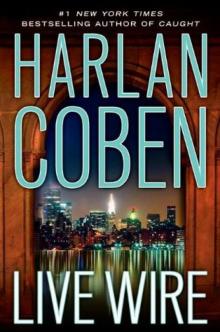 Live Wire
Live Wire Play Dead
Play Dead Drop Shot
Drop Shot Seconds Away
Seconds Away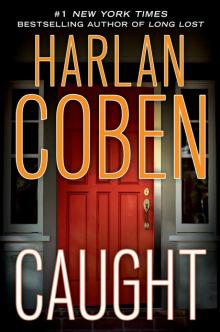 Caught
Caught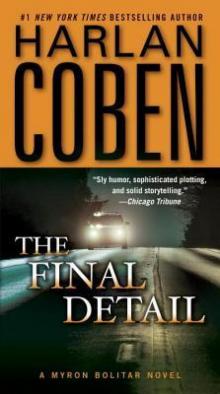 The Final Detail
The Final Detail Fade Away
Fade Away Home
Home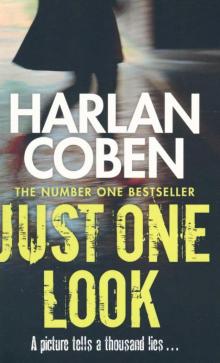 Just One Look
Just One Look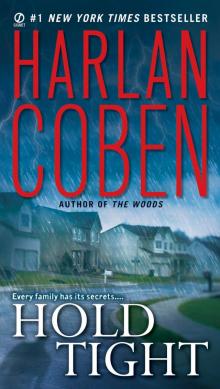 Hold Tight
Hold Tight Fool Me Once
Fool Me Once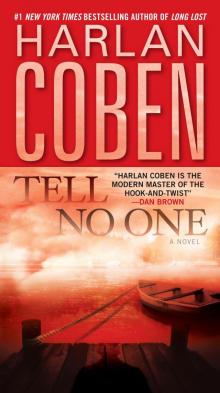 Tell No One
Tell No One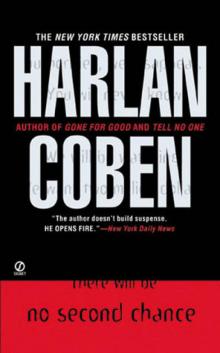 No Second Chance
No Second Chance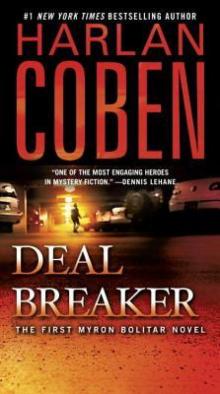 Deal Breaker
Deal Breaker Long Lost
Long Lost One False Move
One False Move The Woods
The Woods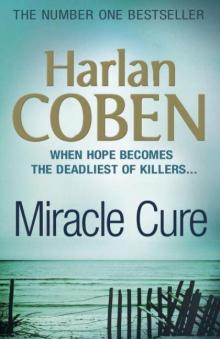 Miracle Cure
Miracle Cure Found
Found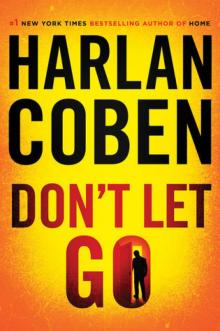 Don't Let Go
Don't Let Go Darkest Fear
Darkest Fear The Stranger
The Stranger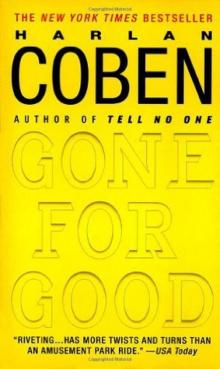 Gone for Good
Gone for Good Back Spin
Back Spin Shelter
Shelter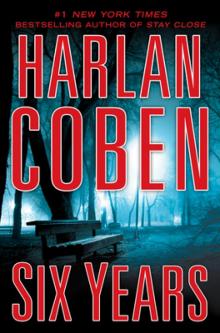 Six Years
Six Years The Boy from the Woods
The Boy from the Woods Missing You
Missing You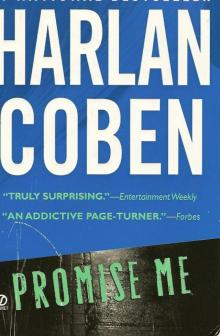 Promise Me mb-8
Promise Me mb-8 The Final Detail: A Myron Bolitar Novel
The Final Detail: A Myron Bolitar Novel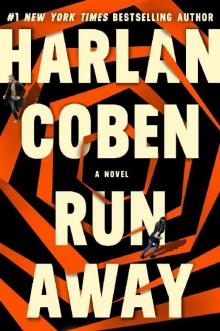 Run Away
Run Away One False Move: A Myron Bolitar Novel
One False Move: A Myron Bolitar Novel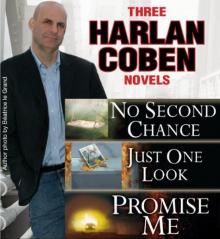 Three Harlan Coben Novels
Three Harlan Coben Novels the Woods (2007)
the Woods (2007) Tell No One (2001)
Tell No One (2001) the Innocent (2005)
the Innocent (2005) The Myron Bolitar Series 7-Book Bundle
The Myron Bolitar Series 7-Book Bundle Gone for Good (2002)
Gone for Good (2002) Caught (2010)
Caught (2010) Hold Tight (2008)
Hold Tight (2008)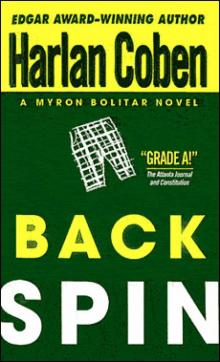 04 - Back Spin
04 - Back Spin Miracle Cure (1991)
Miracle Cure (1991) Harlan Coben 3 Novel Collection
Harlan Coben 3 Novel Collection Just One Look (2004)
Just One Look (2004)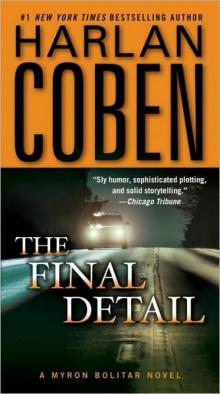 The Final Detail mb-6
The Final Detail mb-6 Play Dead (2010)
Play Dead (2010)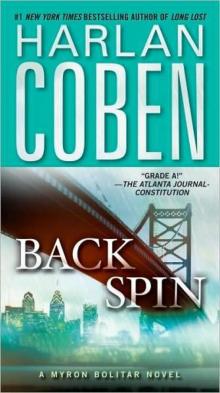 Back Spin mb-4
Back Spin mb-4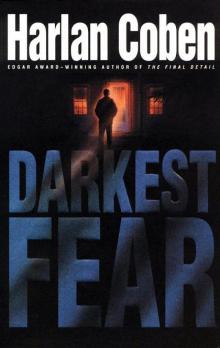 Darkest Fear mb-7
Darkest Fear mb-7